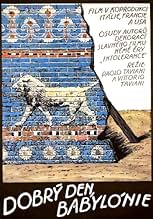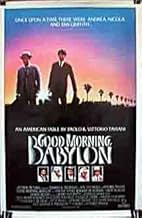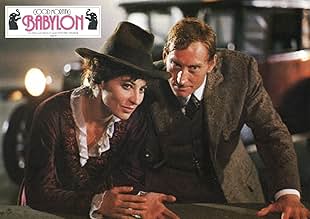Good morning Babilonia
- 1987
- Tous publics
- 1h 57m
After the bankruptcy of their father's stonemasonry firm, Nicola and Andrea emigrate to America to restore their fortunes. After many adventures and near-disasters, they end up in Hollywood ... Read allAfter the bankruptcy of their father's stonemasonry firm, Nicola and Andrea emigrate to America to restore their fortunes. After many adventures and near-disasters, they end up in Hollywood designing sets for D.W. Griffith and marry beautiful actresses, but tragedy strikes with t... Read allAfter the bankruptcy of their father's stonemasonry firm, Nicola and Andrea emigrate to America to restore their fortunes. After many adventures and near-disasters, they end up in Hollywood designing sets for D.W. Griffith and marry beautiful actresses, but tragedy strikes with the arrival of World War I, which finds the brothers fighting on opposite sides...
- Awards
- 3 wins & 1 nomination total
- Mabel Bonnano
- (as Desiree Becker)
Featured reviews
When legendary movie maker D.W. Griffith sees the film CABIRIA and the exposition lit by searchlights he calls for the Italians to come to Hollywood. He has a grand idea for a film he's making. The films is INTOLERANCE.
The brothers finally break through the bureaucracy surrounding Griffith and design the gigantic elephants and other designs for the massive Babylonian sets for the film. Along the way they marry movie extras and settle into a successful life as artisans in Hollywood. Then comes World War I.
The film by the Taviani brothers has a dreamlike quality that blurs the line between fact and fiction. While Griffith (played by Charles Dance) is front and center in the Hollywood segments, his wife, Linda Arvidson, is never mentioned by name nor is cameraman Billy Bitzer. Aside from Griffith, no real person in Hollywood is mentioned by name.
Vincent Spano and Joaquim de Almeida are fine as the Italian brothers, and Greta Scacchi is good as the doomed wife.
After all the hubbub about INTOLERANCE and much time spent on the building of the sets, there's only a very brief clip from the real film shown.
In "Good morning Babilonia" they tell the story of two stonemasons out of work in Italy after finishing their last job of restoring a cathedral. They emigrate to the USA and after some wanderings become set builders for the Babilonian episode in D. W. Griffith's "Intolerance" (1916).
Apart from the plot element of emigrating from Italy to America, a common plot element from the Taviani's (see for example the first episode of "KAOS" (1984)), the film tells the story of early Hollywood. Incidentally another film about early Hollywood is called "Babylon" (2022, Damien Chazelle). This association of Hollywood with the old Babylon is no coincidence. In the first place Babylon and Hollywood are both associated with decadence and moral debauchery. Secondly it may also have something to do with the Biblical story of the tower of Babel, containing the elements of pride and multilingualism.
"Good morning Babilonia" is not one of the best movies of the Taviani brothers. The story of the old Hollywood is too light footed, the ending is too sentimental and the theme of the brothers that try very hard to remain equal in order to give jealousy no chance (until fate decides otherwise) is too artificial (even their wives become pregnant in sync).
I wonder if with respect to the brother element of the story the Taviani brothers may have refered to themselves. Just like the Coen brothers (until recently) they always shared the credits of their films.
The one element in this film that in my opinion is vintage Taviani is the pride of the craftsman. The scene early in the film of a group of craftsmen celebrating the completion of the restoration of the cathedral and at the same time mourning about the fact that there is no next job trembles with anger and disbelief. How is it possibe that there is no job for craftsmen that are so good at their job! Later in the movie the father of the two main characters meets the famous director D. W. Griffith. The scene is all about a battle of ego's. The father is of the opinion that he may be less famous than the director, but with cathedrals he makes things for eternity whereas the director makes something fleeting as a film.
As a matter of fact "Intolerance" (1916) is still considered a masterpiece, so it wasn't fleeting after all. The message of the respect that is due to a craftsman remains loud and clear. This message is unfortunately limited to the scenes with the father, and these are too few to save the movie from mediocrity.
Did you know
- TriviaThe epic silent movie that director D.W. Griffith was making in this film was Intolérance (1916).
- GoofsThe director D.W. Griffith is sat into his car and looking outside the right window, attracted by the Italian Pavillion of the Universal Expo in San Francisco. He asks the driver to stop, gets down, walks around the car and, on the left side, looks again towards the Pavillion (that should have been on the right side)
- Quotes
D.W. Griffith: Never mind. Artists communicate through their work.
- ConnectionsFeatures Intolérance (1916)
- SoundtracksLa Gazza Ladra - Sinfonia
Composed by Gioachino Rossini
Libretto by Giovanni Gherardini [based on "La pie voleuse" by Théodore Baudouin d'Aubigny and Louis-Charles Caigniez ]
- How long is Good Morning Babylon?Powered by Alexa
Details
Box office
- Gross US & Canada
- $183,700
- Opening weekend US & Canada
- $24,569
- Jul 19, 1987
- Gross worldwide
- $183,700
Contribute to this page





























